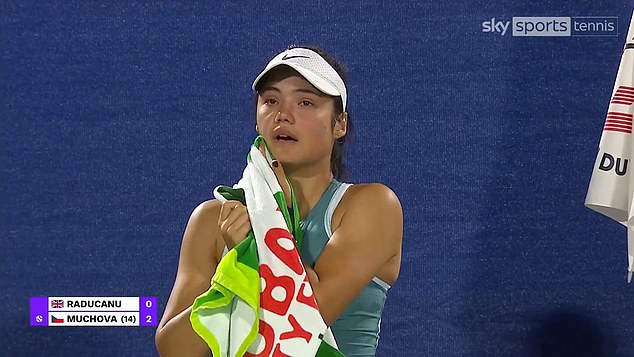A tearful Emma Raducanu was reduced to cowering behind the umpire’s chair at the Dubai Open after she spotted a man who had previously ‘exhibited fixated behaviour’ towards her sitting in the stands.
Raducanu’s rain-delayed meeting with Karolina Muchova was just two games old when the 22-year-old approached the chair umpire, Germany’s Miriam Bley, in visible distress.
She appeared to offer a few brief words of explanation before retreating behind the umpire’s chair, where she was consoled by her Czech opponent as Bley used a walkie talkie to alert tournament officials to the problem.
The WTA, the governing body of the women’s game, later released a statement revealing that a man was removed from the stands and would be barred from attending future WTA events pending further investigation of the circumstances surrounding the incident.
‘On Monday, February 17, Emma Raducanu was approached in a public area by a man who exhibited fixated behavior,’ said the statement. ‘This same individual was identified in the first few rows during Emma’s match on Tuesday at the Dubai Duty Free Tennis Championships and subsequently ejected. He will be banned from all WTA events pending a threat assessment.
‘Player safety is our top priority, and tournaments are advised on security best practices for international sporting events.
‘The WTA is actively working with Emma and her team to ensure her well-being and provide any necessary support. We remain committed to collaborating with tournaments and their security teams worldwide to maintain a safe environment for all players.’
While no details have yet been revealed about the man’s identity, it is understood he is not a British national.
Emma Raducanu was left distressed and in tears after she was repeatedly approached by a man at the Dubai Open
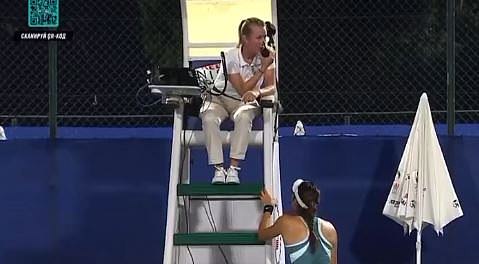
The former British No1 communicated with the umpire after she appeared to notice someone watching the match
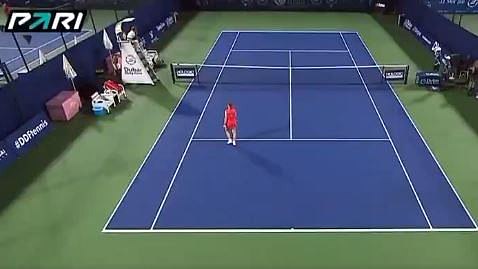
As Raducanu sheltered behind the umpire’s chair, her opponent Karoline Muchova made her way over to comfort her
It would therefore seem there is no connection between the latest incident and a previous case involving a delivery driver from north-west London who was handed a five-year restraining order in February 2022 after repeatedly visiting Raducanu’s home.
Raducanu said after that episode that the actions of Amrit Magar – who loitered outside her house, left unwanted gifts and cards, and stole property from her porch – had made her feel unsafe in her own home and left her ‘constantly looking over her shoulder’.
‘Since all this has happened, I have felt creeped out,’ Raducanu said in a statement at the time. ‘I feel very apprehensive if I go out, especially if I am on my own.’
‘Because of this I feel like my freedom has been taken away from me. I am constantly looking over my shoulder. I feel on edge and worried this could happen again.’
Raducanu’s first meeting with Muchova, a former French Open finalist who has been ranked as high as eighth in the world, had originally been scheduled for court one at Dubai’s Aviation Club Tennis Centre before the inclement weather forced a switch to court two.
The court is sandwiched between two others, with spectators seated behind the baseline rather than along either side of the court. That meant Raducanu, who went on to lose 7-6 (8-6), 6-4, was directly facing the man from one end of the court, while aware of his presence behind her at the other.
Officials moved swiftly to deal with the situation.
‘The tournament security team worked in collaboration with the WTA security team to proactively identify and immediately eject the individual,’ organisers of the WTA 1000 event said in a statement.

The player fought on and returned to see out the match but was unable to battle back after losing the first set

Amrit Magar, 35, was handed a five-year restraining order and sentenced to an 18-month community order in 2022
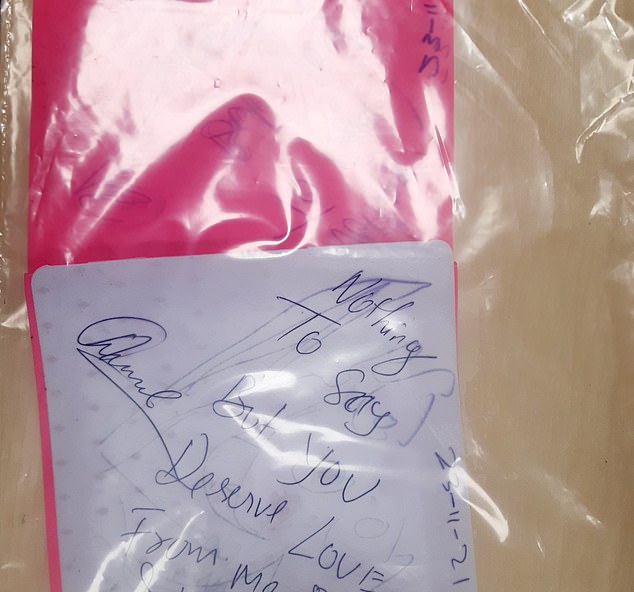
Magar first visited the Raducanu family home in November 2021 with a bouquet of flowers and a note, but said he was a delivery driver dropping off gifts from somebody else
Raducanu was able to continue after a brief delay, and went on to give a good account of herself in a close straight-sets defeat, but comparisons will inevitably be drawn with similar incidents involving high-profile female players.
The most notorious of those involved Monica Seles, a former world No 1 from Serbian Yugoslavia who was stabbed during a changeover at an event in Hamburg in April 1993.
Her attacker, a 38-year-old German named Günter Parche who was motivated by a desire to see Steffi Graf, Seles’ German rival, restored to the No 1 ranking, made his way past security staff before plunging a knife into Seles’ upper back.
The episode is widely regarded as having altered the course of tennis history. Seles, who was 19 at the time, had amassed eight grand slam titles by the time of the incident, but would add only one more, at the 1996 Australian Open, before her retirement in 2008.
Efforts were made to improve security arrangements at tournaments in the aftermath of the attack. These included more thorough searching of spectators as they arrived at events, more security staff to accompany players between the locker room and the court, and a ramped-up security presence around the court, most visibly at the change of ends.
Yet the measures did little to create a greater sense of safety among players.
In September 2001, a 34-year-old German man named Albrecht Stromeyer began stalking Serena Williams, following her across tournaments in Europe and the US before he was finally apprehended by police at the US Open.
The American former world No 1 was later hounded by another man, Patenema Ouedraogo, who was 40 when he was taken into custody after attempting to enter a gated complex in south Florida where Williams was living in 2011.

Serena Williams, the retired former world No 1 and 23-time grand slam singles champion, attracted unwanted attention from obsessive fans on more than one occasion in her career
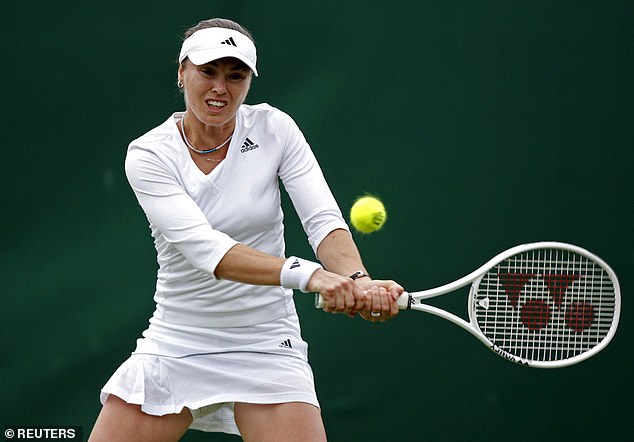
Martina Hingis, another former world No 1, seen here in action at Wimbledon in 2007, testified in court against an Australian naval architect who stalked her between 1999 and 2000

British No 1 Katie Boulter has also been hounded by strangers, one of whom messaged her on social media threatening to harm her during a grass-court event in Nottingham
Martina Hingis, another former world No 1, was moved to hire a bodyguard after she was persistently followed by Dubravko Rajcevic, a middle-aged Australian naval architect, between 1999 and 2000.
Rajcevic, who shadowed her from tournament to tournament, lurked outside her home, and showered her with letters and gifts, was arrested in Miami in spring 2000 and subsequently jailed for two years after Hingis testified against him in court.
‘I’m happy that he’s in jail,’ Hingis later told the Observer. ‘I guess we attract these strange people. Girls in short skirts – the highest paid women’s sport – the profile. It’s become so much bigger, more global, like showbusiness.’
Following Sloane Stephens’ title-winning run at the US Open in 2017, the FBI were moved to intervene when an obsessive fan began bombarding the American and her family with messages.
‘It was like, thousands of messages that this one person had sent, only to me,’ Stephens told the Tennis Insider Club podcast. ‘After I had won the US Open, it was literally non-stop, but it was to everyone in my family.’
Stephens’ fellow countrywoman Danielle Collins, the world No 12, has said the problem is pervasive in women’s tennis.
‘I’ve had to be very vigilant and cautious about how I conduct my life, to make sure I’m safe,’ Collins said last summer.
‘I think sometimes that has come across to fans as being withdrawn, distant, but the reality is that sometimes I’ve had to be more careful about what I say and do because I don’t want certain people knowing where I am, what I’m doing or patterns in my day-to-day life.’
That caution is understandable. Katie Boulter, the British No 1, has recounted how she has often been hounded by strangers, perhaps most notably when someone contacted her on social media while she was competing at a pre-Wimbledon event in Nottingham.
‘I’m outside,’ read the unsettling message. ‘I’m going to hurt you if you come outside.’ The individual responsible was subsequently found on the tournament site.
Boulter was also followed by a car when she went to pick up her fiancé Alex de Minaur, the Australian world No 8, from the Queen’s Club in west Kensington, London. The couple subsequently went shopping only to be followed home by the same car.
‘It happens to all of us, it’s part of life when you’re in the public eye a little bit,’ said Boulter. ‘Obviously you don’t feel comfortable.’
For Raducanu, the incident could hardly have come at a worse moment. Having claimed a notable win over Maria Sakkari in the opening round, breaking a sequence of four consecutive defeats – the worst run of her short career – the former US Open champion would have been relishing the prospect of facing another former top-10 opponent in Muchova.
The Czech’s current ranking of 17th is a reflection of the wrist surgery she underwent last February than her ability, which carried her to the second US Open semi-final of her career last September, and it is to Raducanu’s credit that she managed to make a fight of the match after her inauspicious start.
The Briton rallied from 0-4 down in the opening set to force a tiebreak, which she led 5-2 before Muchova came storming back.
Tennis-wise, it nonetheless marked an encouraging conclusion to the Middle East swing for Raducanu following straight-set defeats at the hands of former Wimbledon champion Marketa Vondrousova in Abu Dhabi and Ekaterina Alexandrova, the Russian world No 22,at the Qatar Open.
Source link : http://www.bing.com/news/apiclick.aspx?ref=FexRss&aid=&tid=67b628bf261648e2aaece53cddc9b0b9&url=https%3A%2F%2Fwww.dailymail.co.uk%2Fsport%2Ftennis%2Farticle-14412135%2FEmma-Raducanu-targeted-man-fixated-behaviour-Dubai-Open-match-tears-WTA-stalker-restraining-order.html&c=13008837989192527760&mkt=de-de
Author :
Publish date : 2025-02-19 08:12:00
Copyright for syndicated content belongs to the linked Source.















































